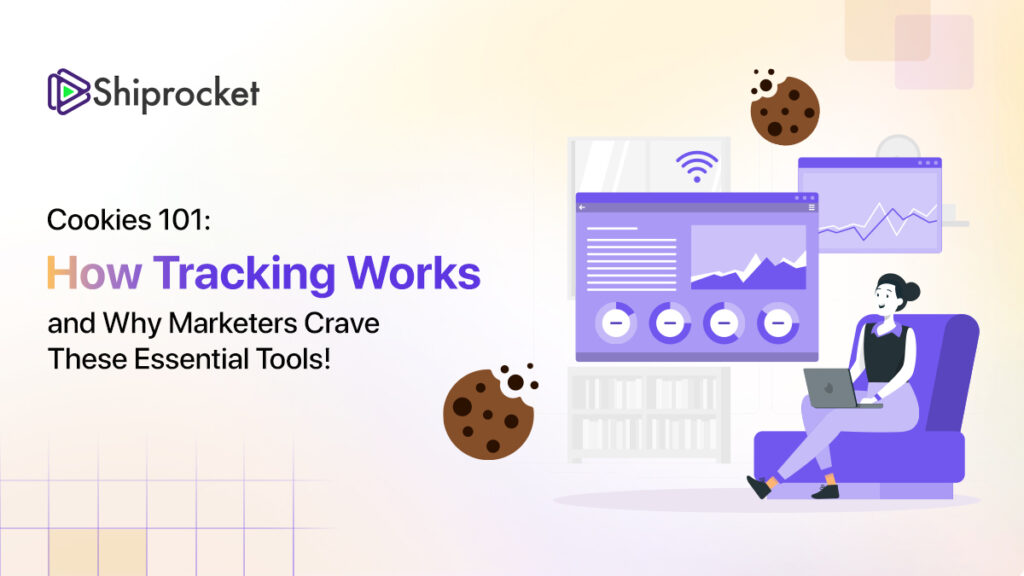- What Are Cookies?
- Types of Cookies
- Importance of Cookies in the Digital World
- How Do You Enable and Remove Cookies?
- Why Marketers Love Cookies?
- The Future of Digital Tracking and Cookies
- How the Phase-Out of Third-Party Cookies Will Affect D2C Brands
- Navigating the Cookieless Future: Key Challenges and Strategies for Indian Businesses
- Transform Your Shipping Process: Elevate Customer Experience and Global Reach
- Conclusion
You’ve most likely seen sites ask you to allow cookies when browsing the internet. But what are cookies, and why are they important? Cookies are necessary to improve the online experience. For nearly thirty years, they have been a mainstay of digital advertising, used by around 80% of marketers to analyse campaign performance and target specific demographics.
Businesses would need to discover other ways to sell themselves online if cookies were removed effectively. In this article, we’ll explore how cookie tracking works and its role in digital advertising.

What Are Cookies?
Cookies or internet cookies are tiny pieces of data that a website adds to your browser when you visit it. These small text files are created or updated during your visit and stored on your browser. Cookies store information about user sessions, preferences, and other data related to the website, helping it remember you and track your activities for a personalised experience.
Cookies are tiny files saved on your computer containing specific website data. Both the web server and your computer can access these files.
Cookies were designed to store information about your preferences. For example, when you choose a language for viewing a website, the site saves this preference in a cookie on your computer. The next time you visit, the website reads the cookie and displays the site in your chosen language without requiring you to select it again.
Cookies can contain various information, such as the time you visited the site, items added to your shopping cart, and the links you clicked on the website.
Types of Cookies
There are different types of cookies, each serving its unique purpose. Let’s discuss the four main types of cookies in detail:
- Session Cookies
- Persistent Cookies
- First-Party Cookies
- Third-Party Cookies
Session Cookies:
Session or temporary cookies exist only while the browser is open. These cookies are removed once the browser is closed or after a period of inactivity, ensuring user privacy. They are mainly used to maintain user sessions. They enhance security by requiring re-login if someone else uses the same computer.
For instance, when someone logs into a website, session cookies keep them logged in as they navigate different pages. If someone else uses that computer, they won’t see the previous user’s session information, as this type of cookie requires users to log in again.
Persistent Cookies:
Persistent cookies, also known as permanent or long-term cookies, last longer than session cookies. They are stored on the user’s device for a period, often less than six months but sometimes up to a year. These cookies are used for long-term tracking and remembering user preferences. It helps remember login information and user preferences over a more extended period. They allow websites to recall how users arrived and track interactions over time.
For example, they store login details or language settings, so visitors don’t have to re-enter the website every time they visit it. Persistent cookies are helpful for websites that need to know who you are over multiple sessions and can track how you initially came to the site.
First-Party Cookies:
First-party cookies are sent by the website the user is currently visiting. These cookies are crucial for providing a good user experience. They collect analytics data, remember language preferences, and store other settings that enhance visitors’ online shopping experience. These help in improving the user experience by storing preferences and settings. They are essential for personalisation and analytics.
For instance, if a user customises the layout of a website, first-party cookies save these preferences, ensuring a consistent experience each time.
Third-Party Cookies:
Such cookies are set by domains other than the one the user is visiting. These cookies are helpful for cross-site tracking and advertising purposes. For example, when someone visits a website, it may include ads or social media widgets from other domains. These third-party domains can set cookies on the user’s browser to track their online activity and build profiles for targeted advertising.
This means that if they visit one site and then another, third-party cookies can track this behaviour across both sites and serve ads based on browsing habits. These cookies are used by advertisers to display relevant ads based on browsing history, helping them avoid showing ads to uninterested users.
Importance of Cookies in the Digital World
These are a few benefits of cookies in the digital world:
- Managing User Sessions: As a seller, cookies are vital for managing user sessions effectively. They allow your website to remember important details like login credentials and user preferences throughout their visit.
- Personalising User Experience: Cookies play a crucial role in enhancing the user experience through personalisation. By tracking user behaviour, such as the types of products, they view or the sections of your site they frequent, cookies enable you to tailor content and advertisements specifically to their interests.
- For example, if users often browse sports-related content, cookies can ensure they see more relevant updates and offers in that category. Cookies remember language preferences and other customisation choices, providing a seamless and personalised browsing experience.
- Tracking User Behaviour: Understanding how users engage with your website is essential for improving your services. Cookies provide valuable insights by tracking which pages users visit most frequently, how long they spend on each page, and which products they show interest in. This data helps you analyse user engagement and make informed decisions to optimise your site’s layout, content, and product offerings.
- Efficient Data Storage: Cookies operate on a simple yet efficient key-value storage system. This structure lets them quickly store and retrieve small information like user preferences and session data. By utilising this method, cookies ensure that user interactions with your site remain smooth and uninterrupted, even across multiple visits.
- Enhancing Security: In addition to improving user experience, cookies also contribute to the security of your website. Features like HttpOnly and Secure attributes help protect user data from unauthorised access and potential security threats. HttpOnly ensures that cookies can only be accessed through HTTP or HTTPS protocols, reducing the risk of cross-site scripting attacks. Meanwhile, Secure attributes enforce encrypted communication, safeguarding sensitive information between the user’s browser and your server.
- Authentication and Session Maintenance: Maintaining user sessions and authentication ensures a seamless browsing experience. Cookies play a pivotal role in keeping users logged in across different pages of your site, eliminating the need for users to log in repeatedly during a single session.
How Do You Enable and Remove Cookies?
Enabling cookies can enhance customers’ browsing experience. To allow cookies on a device, locate the browser’s cookie settings, often found under Privacy Settings. Select the option to enable cookies, sometimes labelled as allowing “local” data.
Removing cookies can protect privacy and reset browser tracking. Navigate to the Privacy section in the browser settings, sometimes found under Tools, Internet Options, or Advanced. Follow the prompts to manage or delete cookies. Removing cookies may impact website navigation and require users to re-enter data. Although different browsers store cookies differently, the process is generally straightforward.
Why Marketers Love Cookies?
Marketers value cookies for their pivotal role in enhancing digital marketing strategies and improving customer engagement. Here’s why cookies are essential for marketers:
- Personalised Advertising: Cookies enable marketers to deliver ads based on user’s browsing history and preferences. This targeted approach increases ads’ relevance, improving click-through and conversion rates.
- Enhanced Targeting and Retargeting: By tracking user behaviour across websites, cookies help marketers identify potential customers and tailor marketing campaigns accordingly. Retargeting ads to users interested in specific products or services increases the likelihood of conversion.
- Measuring Campaign Effectiveness: Cookies provide valuable insights into campaign performance by tracking user interactions, conversions, and ROI. Marketers can analyse click-through rates, bounce rates, and conversion funnels to optimise their marketing strategies.
- Audience Segmentation: Cookies support audience segmentation based on demographics, interests, and behaviour patterns. This segmentation allows marketers to create targeted messaging and offers that resonate with varying client segments.
- Cross-Device Tracking: Cookies help track user activities across multiple devices, providing an overall view of customer journeys. This cross-device tracking ensures consistent messaging and personalised experiences across desktops, smartphones, and tablets.
- Improving User Experience: By remembering user choices and settings, cookies enhance user experience by offering personalised content, faster navigation, and seamless interactions. This builds customer satisfaction and loyalty.
- Gaining Consumer Insights: Cookies generate valuable data about consumer behaviour, interests, and purchasing patterns. Marketers use this data to understand market trends, predict future behaviours, and make informed business decisions.
The Future of Digital Tracking and Cookies
As third-party cookies disappear, digital marketers need new strategies. Focus on using data from your website visitors like email addresses, what they buy, and their preferences to build better relationships and offer personalised experiences. Create strong plans for using this data to send messages and deals that fit your audience well, adapting to the changes without third-party cookies.
Try different ways to advertise, like showing ads that match the content of web pages instead of using personal data. This keeps ads relevant to what people are reading. Use privacy-focused methods, such as ways to collect data that protect people’s privacy while giving you helpful information about groups of users.
Use advanced technology, like machine learning and predictive tools, to understand how users behave without invading their privacy. Make clear rules about confidentiality, provide easy ways for users to agree to cookies, and provide simple ways to control what data you use. This helps you keep customer trust as the digital world changes without cookies.
How the Phase-Out of Third-Party Cookies Will Affect D2C Brands
The removal of third-party cookies is a significant shift in web privacy. These cookies have long been used to track user behaviour across different websites. With third-party cookies disappearing, traditional tracking and targeting methods will no longer be as effective. This change will directly affect how Direct-to-Consumer (D2C) brands conduct digital campaigns. These are:
- Retargeting becomes more difficult. Brands have relied on these cookies to track users who visited their sites but did not make a purchase. Without cookies, re-engaging these potential customers will be more demanding.
- The attribution of conversions to specific campaigns will be less accurate. Brands will struggle to determine which marketing efforts are driving sales, making it challenging to assess the effectiveness of their strategies.
These challenges will require D2C brands to adapt by focusing on first-party data, enhancing user consent practices, and exploring alternative tracking technologies to maintain effective marketing while respecting user privacy.
Navigating the Cookieless Future: Key Challenges and Strategies for Indian Businesses
As the world moves towards a cookieless future, Indian businesses must prepare for significant changes in their digital marketing strategies. A 2022 survey revealed that 53% of Indian marketing leaders prioritise their readiness for this transition, while 47% are not yet focused on it. This shift brings both challenges and opportunities that need to be addressed.
Challenges Faced by Indian Businesses
- Dependence on Third-Party Data: Indian businesses have long relied on third-party data for audience segmentation and personalised advertising. With cookies being phased out, companies will find it challenging to access detailed information about their target audiences. This lack of data will make creating effective, personalised marketing campaigns harder. Companies that heavily depend on third-party cookies must find new ways to gather and analyse customer data.
- Lack of Awareness of Alternative Tracking Methods: Many businesses in India are unaware of the alternative methods for tracking and targeting customers. Techniques such as browser fingerprinting, device graphing, and contextual advertising can replace cookies but are not yet widely understood or adopted. This lack of awareness means businesses might struggle to implement these new methods effectively, potentially losing marketing efficiency and reach.
- Impact on Ad Effectiveness: Without cookies, the ability to track user behaviour across different websites diminishes. This reduction in tracking capabilities affects how well businesses can understand and predict customer behaviour, making it more challenging to deliver relevant ads. Consequently, advertising may become less effective, leading to lower engagement rates and potentially higher advertising costs as businesses try to reach their desired audience through less precise methods.
- Increased Reliance on Tech Solutions: As businesses look for new ways to track and target customers without cookies, there will be a growing reliance on advanced technology solutions. This shift may require significant investment in new tools and platforms and training for marketing teams to use these technologies effectively. Smaller businesses, in particular, might find it challenging to keep up with these changes due to limited resources.
To navigate the cookieless future, Indian businesses can leverage first-party data by building direct relationships with customers and gaining explicit consent for data collection, which helps deliver personalised experiences and targeted campaigns.
Embracing contextual advertising, which targets audiences based on the web page’s content rather than tracking individual user behaviour, can also prove effective. They can also implement localised marketing strategies, allowing businesses to tailor their messages to regional preferences and cultural nuances, connecting with consumers personally and fostering brand loyalty and engagement.
Transform Your Shipping Process: Elevate Customer Experience and Global Reach
Optimise your online business journey by simplifying your shipping processes and enhancing customer experiences with Shiprocket. You can expand your business globally with cross-border shipping solutions, allowing you to ship to over 220 countries and territories. Access transparent B2B deliveries via air with no weight restrictions and start selling internationally with minimal investment risk.
You can place your inventory closer to customers for quicker B2C and B2B order fulfillment. Connect your warehouses, stores, and marketplaces to provide a seamless experience. With their extensive courier network, you can reach every customer, even in remote areas. Manage everything from sales channels to inventory on a single platform, utilising AI-driven analytics for smarter business decisions. You can also customise workflows to meet customer and business needs and rely on dedicated account management for support at every step. Integrate over 12 sales channels to streamline your operations and ensure smooth management of your orders.
Conclusion
Your online advertising plan relies on cookies. They help you target your audience and offer personalised experiences. Cookies are crucial for understanding client preferences and boosting engagement by tracking user behaviour.
To gain and keep customer trust, you must use ethical data practices. This is especially important with evolving digital landscapes and stricter data privacy laws. Embrace new privacy-enhancing technologies. Explore other ways to identify users. Prioritise user privacy.
Doing so allows you to continue using cookies and other methods to deliver targeted content. This approach will improve customer satisfaction transparently and ethically.





